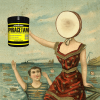
Amphetamine Neurotoxicity Reduction/Prevention
#121
Posted 22 August 2011 - 02:55 AM
I'm about to start using Deprenyl (Selegiline) because I believe that it would have a repairing effect on the Dopamine receptors that were/may have been damaged during high doses of amphetamines. But this is all just a theory; there is no evidence to my knowledge that this even works. But it makes sense giving Selegiline's mode of action.
#122
Posted 22 August 2011 - 07:04 AM
I'm actually really interested in this subject.
I'm about to start using Deprenyl (Selegiline) because I believe that it would have a repairing effect on the Dopamine receptors that were/may have been damaged during high doses of amphetamines. But this is all just a theory; there is no evidence to my knowledge that this even works. But it makes sense giving Selegiline's mode of action.
So are you talking about using it to prevent further toxicity during amphetamine use or more for speeding up recovery? I haven't heard anything before about selegiline resulting in increased DA receptor sensitivity or numbers but that doesn't necessarily mean it doesn't happen.
#123
Posted 22 August 2011 - 02:49 PM
So are you talking about using it to prevent further toxicity during amphetamine use or more for speeding up recovery? I haven't heard anything before about selegiline resulting in increased DA receptor sensitivity or numbers but that doesn't necessarily mean it doesn't happen.
I'm talking about using it for speeding up recovery AFTER amphetamine use.
I don't think it would be wise to use it while still using amphetamines since it's an MAO inhibitor.
Of course this is all just a theory, it hasn't been tried but as soon as my Selegiline gets here from ADC, I will start at 2.5mg 2x a week.
Effect of low-dose treatment with selegiline on dopamine transporter (DAT) expression and amphetamine-induced dopamine release in vivo.
http://www.ncbi.nlm....pubmed/10193780
I thought that Sulbutiamine caused an increase in Dopamine receptor density, but upon researching on PubMed, I found this isn't true.
Evidence for a modulatory effect of sulbutiamine on glutamatergic and dopaminergic cortical transmissions in the rat brain.
http://www.ncbi.nlm....pubmed/10996447
Edited by Dirk_Diggler, 22 August 2011 - 03:07 PM.
#124
Posted 22 August 2011 - 11:11 PM
So are you talking about using it to prevent further toxicity during amphetamine use or more for speeding up recovery? I haven't heard anything before about selegiline resulting in increased DA receptor sensitivity or numbers but that doesn't necessarily mean it doesn't happen.
I'm talking about using it for speeding up recovery AFTER amphetamine use.
I don't think it would be wise to use it while still using amphetamines since it's an MAO inhibitor.
Of course this is all just a theory, it hasn't been tried but as soon as my Selegiline gets here from ADC, I will start at 2.5mg 2x a week.
Effect of low-dose treatment with selegiline on dopamine transporter (DAT) expression and amphetamine-induced dopamine release in vivo.
http://www.ncbi.nlm....pubmed/10193780
I thought that Sulbutiamine caused an increase in Dopamine receptor density, but upon researching on PubMed, I found this isn't true.
Evidence for a modulatory effect of sulbutiamine on glutamatergic and dopaminergic cortical transmissions in the rat brain.
http://www.ncbi.nlm....pubmed/10996447
I can't really say anything either way on that, there really isn't much research on it. But, if you want to trial selegiline please post your experience. On paper it looks like it might help ease amphetamine withdrawal. What I can say though is that a healthy diet, sunlight, and vigorous aerobic exercise are all known to improve functions in systems amphetamine is known to damage.
Edited by Delta Gamma, 22 August 2011 - 11:12 PM.
#125
Posted 23 August 2011 - 09:41 AM
Edit: oops I missed that it wa amph WD you were talking about...
Edited by klantskalle, 23 August 2011 - 09:43 AM.
#126
Posted 23 August 2011 - 06:25 PM
#127
Posted 31 August 2011 - 06:52 AM
#128
Posted 07 December 2011 - 04:37 AM
http://www.ncbi.nlm....pubmed/18639368
http://www.ncbi.nlm....pubmed/18208543
Given free curcumin crosses the BBB, but glucuronidated curcumin does not, what are your thoughts on this compound potentially limiting amphetamine neurotoxicity and as a nootropic in general?
Edited by Lojiko, 07 December 2011 - 04:37 AM.
#129
Posted 06 January 2012 - 06:19 AM
#130
Posted 06 January 2012 - 07:24 AM
#131
Posted 14 January 2012 - 08:23 PM
Does anyone have an opinion of the effect of NGF and BDNF enhancers - such as bacopa and lion's mane - on amphetamine tolerance? Hypothetically, increased activity in the learning centers of the brain would also serve to increase tolerance faster. What about using NGF/BDNF enhancers during "break" periods, when one isn't using amphetamines?
Bump...
#132
Posted 03 July 2012 - 06:34 AM
To add to the thread stuff I've read to use are, magnesium for NDMA antagonism and various other reasons and R Alpha Lipoic Acid for antioxidative stress. Plus generally sleep alot using melatonin and eat and sleep and eat and sleep. Some of the neurotoxicity is from sleep deprivation I heard.
#133
Posted 03 July 2012 - 06:36 AM
Edited by Major Legend, 03 July 2012 - 06:36 AM.
#134
Posted 25 February 2013 - 05:21 PM
One thing that jumps out at me when you mentioned ECGC is its COMT inhibition. If you're the kind of person who experiences peripheral side effects (vasoconstriction, intestinal disturbances, impotence/peanut sized junk etc.) I can see it increasing them as can curcumin due to its MAOI effects. Your stack other than that looks pretty solid, only thing I would recommend adding is magnesium and a decent multivitamin (preferably low in iron).
I do experience some minor peripheral side effects from amphetamines, primarily vasoconstriction-induced erectile dysfunction (aka, "is it scared to come out and play?"). The l-amp in Adderal particularly does this even at relatively small doses but they all do it to some extent and/or in some circumstances. I haven't noticed EGCG or curcumin increasing this effect but it's not something I've paid close attention to. I was actually under the impression that COMT inhibition could potentially reduce peripheral side effects but I don't remember why I had that idea. Generally, with my current stack and dosing schedule I've got things under control well enough that peripheral side effects are predictably minimal, infrequent, and almost never disruptive to performing necessary tasks.
COMT and MAOI break down catecholamines, so inhibiting them peripherally can result in increased vasoconstriction unless you're a weird one with more DA than EP/NE in their circulation. Gingko is a safe vasodilator if you want to try it out, as is CoQ10.
Though ECGC can also decrease the amount of peripheral catecholamines synthesized via DOPA decarboxylase inhibition. Really depends on the individual and the dose.
#135
Posted 25 February 2013 - 05:53 PM
One thing that jumps out at me when you mentioned ECGC is its COMT inhibition. If you're the kind of person who experiences peripheral side effects (vasoconstriction, intestinal disturbances, impotence/peanut sized junk etc.) I can see it increasing them as can curcumin due to its MAOI effects. Your stack other than that looks pretty solid, only thing I would recommend adding is magnesium and a decent multivitamin (preferably low in iron).
This looks pretty old but I'll take a shot that some one will still respond.
-I have been looking for quite some time now for an informative thread such as this and the posts are phenomenal. I am cursed with very intense peripheral side effects. Primarily the lack of blood flow to feet (toes are literally cold on as little as 5-10mg Add) and the GI symptoms as well. I have not been able to find anything that will mitigate this and if anyone has any stack suggestions PLEASE let me hear it. I usually take 5mg in the am first thing, then 5 more about 2-3 hours later, then another 5-10 at lunch. The symptoms really have never totally subsided for me as others have reported. I have (with no variable to link it) noticed some days are almost symptom free, yet this is not the norm. For the most part it's everyday and has always been the one constant that I can count on.
I am 35 Y.O.A. and in good shape. I run about 20 miles a week if not more and eat well. Diet is very low in sugar of any other gastric irritants for the most part. I have deduced over the yrs (without proper Medical Dx) that I am an IBS sufferer so the gastric component is some thing that is not new to me, thus my diet being rather clean year round. I took Adderall in college with the same side effects. After graduation I stopped for 10 years. I started a new job about a year ago in Oil and Gas Sales and I literally am juggling 15-20 different tasks at all times throughout everyday, thus I got back on the Adderall.
I tried Vyvance and it was terrible. I literally felt like a zombie. I couldn't even hardly talk to my fiance at the end of a workday, much less give her a kiss or hug or anything relatively intimate. That experiment ended rather quickly.
I will say that at this age I take it responsibly, in Grad School a study partner and myself would literally start studying at 9pm and take 20 mg every 2 hrs until 9-12 the next day. The thing is, the side effects I would have to rate just about the same with only 20-30 mg total at my current regiment. For me, I take 5 mg and within 15 minutes the bottom falls out of me, my stomach is totally distended with horrible gas and belching, within an hour my upper traps and suboccipitals are aching like hell, within another couple hrs my toes are damn near frozen. If I stay moving the distal blood flow issues aren't present, only when I stop or end my day etc.
I drink a lot of water, but it's almost as though I cannot retain the fluid no matter how much i take in. I squirt about 20 drops of ionic trace minerals into all the water I drink, I take a good multi, and I have a super green shake daily with half a scoop of the super red as well.
ANY SUGGESTIONS OTHER THAN, "THAT DRUG IS JUST TOO HARSH FOR YOUR NERVOUS SYSTEM" WOULD BE MUCH APPRECIATED.
Edited by kds34, 25 February 2013 - 05:55 PM.
#136
Posted 26 February 2013 - 11:46 PM
Its the same as normal amp man, methamp is only worse because of increased hyperthermia caused by increased da release with added sero release at very high (recreational doses) wich isnt relevant to therapeutic doses.Sorry to revive an old thread, but i'm looking for information on Methamphetamine neurotoxicity at the low dose range anywhere 5mg to 25mg. There are conflicting reports, a lot of people say methamphetamine is dangerously neurotoxic because of many more reasons than plain amphetamine, but all the reports i've read have been at injected high dose with small intervals inbetween like two hours, even the ones meant to mimic human use use extreme amounts akin to a full blown addict.
To add to the thread stuff I've read to use are, magnesium for NDMA antagonism and various other reasons and R Alpha Lipoic Acid for antioxidative stress. Plus generally sleep alot using melatonin and eat and sleep and eat and sleep. Some of the neurotoxicity is from sleep deprivation I heard.
Anyone saying this is untry please cite evidence for this, the evidence ive seen is clear on this subject, added hyperthermia and oxidative stress because of above differences wich isnt relevant on therapeutic doses (those that disagree, therapeutic doses is not a meth binge!)
How the fucking hell has this anything to do with tolerance? if you think neurotoxiticy caused tolerance wow mate then id certainly slow down on injecting doses that are the same as those used for selectively killing da neurons. Any damage that can occur wont affect tolerance in any way wich is caused by da receptor downregulation.Does anyone have an opinion of the effect of NGF and BDNF enhancers - such as bacopa and lion's mane - on amphetamine tolerance? Hypothetically, increased activity in the learning centers of the brain would also serve to increase tolerance faster. What about using NGF/BDNF enhancers during "break" periods, when one isn't using amphetamines?
#137
Posted 11 April 2013 - 12:45 PM
The first obvious reason one should take aspirin is because its an effective anticoagulant and therefore, reduces risk of heart attack and stroke, which is a concern for amphetamine users due to the hypertension amphetamine causes.
But onto neurotoxicity. One way that aspirin protects the brain is via its anti-inflammatory properties. Its been shown that inflammation in the brain is the enemy of neurogenesis.
https://www.ncbi.nlm...pubmed/22985767
http://www.medsci.org/v05p0127.htm
A compound called Activin A is always found in the brains of rats when they undergo effective neurogenesis, and when they inhibit Activin A, neurogenesis comes to a halt. They figured out that Activin A is an anti-inflammatory, and they successfully used other anti-inflammatories instead of activin A to induce neurogenesis. NSAIDs are known to lesson some of the symptoms of neurodegenerative diseases like Parkinsons disease.
Then theres its antipyretic properties. As was mentioned in the OP, keeping the body cool seems to be important when it comes to preventing amphetamine neurotoxicity. And finally, its a potent antioxidant which helps protect ones dopamine neurons against free radical damage.
Also, I don't know if its been mentioned, but nitric oxide inhibitors protect against excitotoxicity in a similar way to NMDA antagonists (binding to NMDA by glutamate causes more NO to by synthesised). Methylene blue is a nitric oxide synthase inhibitor.
EDIT: This thread would be even better if you could explain exactly why each of the things mentioned are beneficial. For example, apoptosis inhibitors like curcumin, I'd never heard about this and I have no idea why they prevent amphetamine neurotoxicity (although it would be logical to assume that maybe natural apoptosis is one of the reasons the neurons die). I'll explain a few things that I understand myself:
Nitric oxide in the brain has neurotoxic properties because it reacts with superoxide to produce nitroperoxide, which is neurotoxic. Superoxide dismutase breaks superoxide down into oxygen and H2O2, therefore bacopa monneira should prevent some neurotoxicity by increasing the production of superoxide dismutase.There is evidence that Bacopa monnieri can upregulate superoxide dismutase in rats, so it may be a worthwhile option to supplement if you don't have a negative reaction to it.
Edited by mycotheologist, 11 April 2013 - 01:07 PM.
#138
Posted 21 April 2013 - 06:27 PM
Does anyone have an opinion of the effect of NGF and BDNF enhancers - such as bacopa and lion's mane - on amphetamine tolerance? Hypothetically, increased activity in the learning centers of the brain would also serve to increase tolerance faster. What about using NGF/BDNF enhancers during "break" periods, when one isn't using amphetamines?
I have wondered about this myself. Theoretically, it seems they could possibly increase tolerance but this is purely theoretical.
I have wondered the same about sarcosine with dexedrine or for breaks as it is an NMDA agonist as opposed to memantine, an NMDA antagonist and thus similarly, theoretically would seem this could also speed tolerance.
Edited by ChemCycler, 21 April 2013 - 06:28 PM.
#139
Posted 24 April 2013 - 02:34 AM
What about ladasten (DSRI) as a replacement or augmentation for the ritalin addition? According to http://www.acnp.org/...00166/ch162.htm ,
4) DA and serotonergic reuptake inhibitors protecting against DA and serotonin toxicity respectively
Piracetam may be useful for the mitochondiral damage http://www.ncbi.nlm....les/PMC1615864/
Selegiline or rasagiline would be useful but very dangerous. I would imagine that rasagiline would be a bit safer due to it not inhibiting MAO-A, but it would still be VERY dangerous, and we shouldn't try it until we can get a dosage worked out. This page seems to have some pretty good advice. Still, it is playing with fire.
And, as others have mentioned, memantine would be helpful.
I wonder what the theoretical stack of all of them would result in.
DO NOT TRY THIS, PLEASE
1. Amphetamine
2. Ritalin and/or Ladasten
3. High doses of piracetam (4-9g/day)
4. Selegiline or Rasagiline
Questions we should look into, I think
What are some ways to stay cool through medicines?
Maybe benzos would help (or legal alternatives like Etizolam). Benzos may end up doing more harm than good in the long run, though.
M8-B looks useful, but I can find almost NOTHING on it.
Reducing TRP activity could have a positive effect.
What dosage of amphetamine would be safe with a MAO-B inhibitor, and would it be safe with the possible non-selective effects of Selegiline?
Combining it with a MAOI could do A LOT for amphetamine, but it could also be VERY, VERY dangerous. The combination could lead to both lower doses and reduction of the parkinson's risk.
#140
Posted 10 May 2013 - 07:01 AM
I rarely if ever check this site anymore, though I do frequent reddit as well u/EpsilonAlphaADD
Amphetamine Neurotoxicity and Tolerance Reduction/Prevention II
Mods, sorry if this is in violation.
Edited by Delta Gamma, 10 May 2013 - 07:07 AM.
#141
Posted 30 December 2013 - 12:11 PM
One thing anyone using curcumin should consider, that most of the available supplements do not cross the BBB, therefore no effects on the brain. I know only of longvida curcumin that it does cross the BBB in humans.
Then I am wondering why repleting glutathione through NAC is no option discussed here... Especially in cases of high oxidative stress, cells scream for NAC. And it does cross the BBB. It should be amongst the most powerful antioxidants, for any oxidative stress that the body usually fights with glutathione.
High oxidative stress can deplete the sulfur cycle, so l-cysteine might be another option(also in combination with nac, since nac does not directly contribute to the sulfur cycle) to give the body the ability to deal with oxidative stress in it's own way.
Also, c60oo would be worth considering.
#142
Posted 07 October 2014 - 02:48 AM
I am having a hard time figuring out the information in this thread, I apologize, but if someone is feeling generous, could you please type a simple list of supplements one should look into whilst on amphetamines, Please? I apologize again, I am just having a hard time reading and retrieving information these days :(.
#143
Posted 10 October 2014 - 12:33 PM
Ok, here goes:
Memantine ( for tollerance reduction)
Magnesium (good form like Citrate, Glycinate, Malate or Threonate)
NAC (as mentioned above - good against neurotoxicity)
Antioxidant herbs in gerneral ( for example Green Tea extract, Curcumine, Grape seed extract a.o.)
Also, though this is not the topic of the thread, some stuff to counter vasoconstrition and elevated heart rate/ BP might be advised:
EGCG (for heart health)
Arginine and/or Citrulline (vasolidators)
Taurine (calms CNS, good for heart and liver)
The cheapest (or most bang for you buck) of the above would be:
Magnesium, NAC, EGCG, Taurine, Arginine and/or Citrulline
examine.com has good articles on all of the above.
Also, no form of stimulant should be taken too long consecutively, and cycling with one or two other substances should be mandatory.
A few (widely available) alternatives would be:
Caffeine/Theanine
Phenylpiracetam ( + cdp-choline maybe, if too harsh on it's own)
Adrafinil or Modafinil
Rhodiola Rosea ( concentrated for Salidrosides, NOT Rosavins!)
Chocamine
I hope this helps! ![]()
#144
Posted 10 October 2014 - 03:56 PM
I'm glad to see this thread still up and running. Preventing damage and tolerance buildup from amphetamines is largely what got me into supplements and healthy lifestyle changes to begin with.
Currently I am prescribed 30mg Dexedrine a day. The euphoria is pretty much all gone now, since I have been using amps for two years now, but it is still easily the most helpful thing I have found for my ADHD.
Things I take, or have taken, mainly to minimize Dex downsides:
- Magnesium Glycinate, ~1000 mg, nightly. It's hard to say if it is making a difference. Something I rarely see discussed is the best timing of supplements in relation to speed; I really don't know if magnesium at night is supposed to be as beneficial as in the morning. Every once in a while I try taking the stuff upon waking, alongside or before the Dex, but inevitably that just makes me feel nauseous and apathetic all day for some reason. It's as though it prevents damage from amphetamines by stopping them from working.
- R-Alpha Lipoic Acid, ~100 mg, in the morning. Again, it's hard to notice any difference, but I'm taking a low dose, and it supposedly works well alongside ALCAR, which I also take (in cycles).
- NAC, 600 mg, on occasion. I noticed recently that on days in which I take NAC with Dex, I tend to be less productive and more anxious. It's a shame, since NAC sounds like a godsend. I suppose I will stick to taking it at night or on off-days.
- Ashwagandha and curcumin, 500 mg each, with breakfast. No noticeable influence. I have only used BioPerine curcumin (Doctor's Best), and some sources insist that longvida is the only way to go; I might give that a shot.
- Lithium orotate, ~1.25 mg, in the morning. Haven't been at it all that long, and it's probably too low of a dose to expect a noticeable change.
- Aspirin, 81 mg, in the morning. Same as the lithium, basically. This stuff is hella cheap and seems to be a very solid option for general health (I'm especially attracted to its cardioprotective properties), as an amp user. The only thing about it that gives me cause for concern is its blood-thinning effects; I'm taking about six grams of fish oil daily, and I can't help but worry that I will be in serious trouble in event of a significant wound.
- Piracetam, 4.8 grams, split into three doses throughout the day. This was my first noot, and I have used it on and off. There doesn't seem to be any consensus about how safe it is to take with powerful stimulants, but I have yet to see research indicating it's dangerous. Piracetam exerts some mitochondrial protection, which I would think would be very important for someone taking amphetamines daily. I probably won't bother getting more of this; it never seems to do much to me.
I also take melatonin as a sleep aid, garlic for cardioprotection and general health, taurine, and some other things that might be protective alongside speed. I drink a whole bunch of green tea, which I think has improved my quality of life. Not sure if it interacts significantly with dextroamphetamine.
I sometimes use a cycle of methylene blue; again, I can't tell if there's any interaction with amps, but it might be helping.
In my experience, sunifiram mixes quite poorly with amphetamines. The most recent time I mixed them, I felt very anxious and "off." However, I have had no problems with nefiracetam, which has very similar mechanisms of action. None of the other racetams I have used seemed to interact with amphetamines.
I have found a few gems that interact very well with speed for me, most notably PRL-8-53. I have only ever used this stuff while on amphetamines, and this seems to make it a different beast. I recall two or three other people in the PRL-8-53 thread saying it is a very nice mix. It makes me feel much more competent and creative than usual, but tolerance builds quickly, so I save it for exams and essays.
There is plenty of research indicating that nicotine sensitizes receptors to amphetamines, and my experiences match this. It's probably not preventative of toxicity, and it might actually make things slightly worse, but it is definitely a helpful boost on occasion.
I just wanted to share some of my experiences, as I find it very helpful to read other people's. Does anyone have input about the timing of supplements like magnesium and NAC with regard to neuroprotection? I plan to continue taking magnesium at least as long as I'm taking amps, since among other things they deplete some magnesium from the body.
#145
Posted 10 October 2014 - 04:26 PM
Wow! This is awesome!
Thank you so much chris106,
Thank you so much as well, Nootropic Milk Hotel,
Thank you for taking the time to type that all out, it is so much easier for me to read and find the information I was looking for.
:D You guys rock!
#146
Posted 14 October 2014 - 08:41 PM
You're welcome!
Never stop looking for solutions!
#147
Posted 20 October 2014 - 11:54 PM
Couldn't figure out how to search this thread (I'm new and ignorant) so forgive me if this was covered.
I think amphetamine toxicity can lead to PPI (prepulse inhibition) deficits, if I'm not mistaken.
I believe I read somewhere h1 receptor antagonist can reverse the PPI deficits. Has anyone experimented with this or have any information on this?
Also is there any neuroprotection occurring with antihistamine and/or anticholinergic effects of certain drugs associated with amphetamine use/toxicity?
Can heavy amphetamine use cause histamine and/or choline toxicity?
Sorry if I broke the flow to the thread.
Thanks for any help.
#148
Posted 21 October 2014 - 11:56 AM
Any evidence amphetamine causes deficits?
Also any evidence toxiticy is still apperant without hyperthermia?
#149
Posted 22 October 2014 - 03:41 PM
I use to abuse amphetamines on occasion and from person experience I believe very high doses/toxicity causes PPI deficits because slight but unexpected auditory and physical stimulation would make me jump/startle the heck out of me, things I usually wouldn't even respond to. I assume that's caused by PPI deficiency.
I think you can feel symptoms of toxicity without noticeable hyperthermia, but I could be wrong.
#150
Posted 22 October 2014 - 05:17 PM
Just take ritalin instead. I've read that methylphenidate isn't as neurotoxic as the amphetamine salts.
2 user(s) are reading this topic
0 members, 2 guests, 0 anonymous users
























































